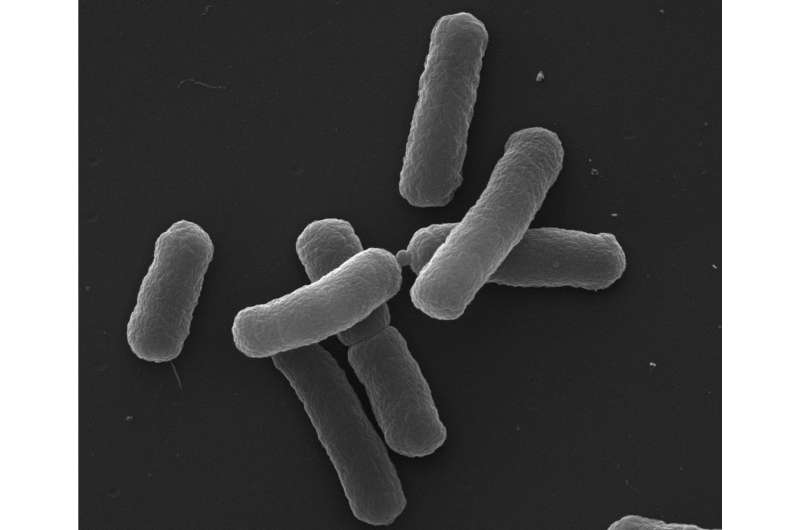Bacteria take a deadly risk to survive

Bacteria need mutations—changes in their DNA code—to survive under difficult circumstances. When necessary, they can even mutate at different speeds. This is shown in a recent study by the Centre of Microbial and Plant Genetics at KU Leuven (University of Leuven), Belgium. The findings open up various new avenues for research, ranging from more efficient biofuel production methods to a better treatment for bacterial infections and cancer.
When they're under stress, bacteria start mutating to produce one or more DNA variants that make it possible for the bacteria to survive and reproduce. But mutating is dangerous under normal circumstances as it weakens the bacteria. The trick, therefore, is finding the balance between too many and too few mutations. Losing this balance means hypermutation: the cell mutates much more quickly than it normally does, eventually leading to death.
As scientific knowledge about the role of hypermutation is still limited, KU Leuven researchers examined its underlying mechanism in the gut bacteria Escherichia coli. "E.coli is a notorious cause of diarrhoea, but most E.coli strains are in fact harmless gut bacteria found in human beings and animals," says Professor Jan Michiels. "Exposure to high, near-lethal concentrations of ethanol triggers hypermutation in the E.coli. We were surprised to find that the speed of hypermutation in the bacteria can rapidly be changed: the bacteria mutate more quickly in higher concentrations of ethanol and more slowly when the ethanol stress is relieved. As soon as the danger is past, the bacteria step on the brake and try to revert to their normal state, without hypermutation."
Hypermutation allowed the bacteria to survive ethanol stress and enabled the researchers to select E. coli mutants that are very resistant to ethanol. This offers new perspectives for research on biofuel production. "In the biofuel production process sugar is derived from plant residues and similar waste products. This sugar, in turn, is converted into ethanol. E.coli bacteria can be used for this purpose: they can convert sugars into ethanol but are eventually killed by the ethanol they produce. The hypermutation enabled us to obtain variants that are less susceptible to ethanol and that grow quickly. This means that we might be able to use them for more efficient biofuel production."
"Another application is the fight against the antibiotic resistance of bacteria and the resistance of cancer cells to chemotherapy," doctoral student Toon Swings adds. "Antibiotics pose a deadly threat to bacteria. The bacteria protect themselves by mutating and, as a result, they develop antibiotic resistance. The same applies to cancer cells after a treatment. Therefore, blocking hypermutation could form a possible treatment or perhaps even a new co-therapy."
More information: Toon Swings et al, Adaptive tuning of mutation rates allows fast response to lethal stress in, eLife (2017). DOI: 10.7554/eLife.22939
Journal information: eLife
Provided by KU Leuven




















